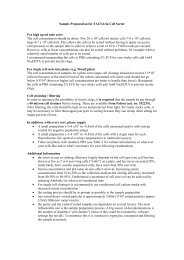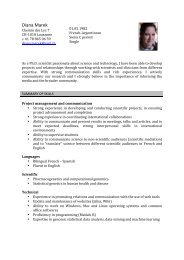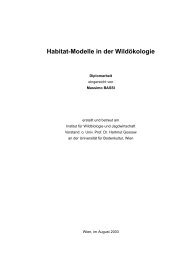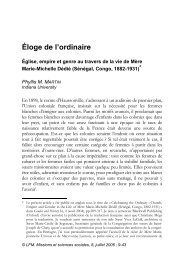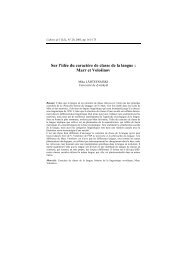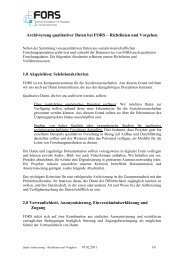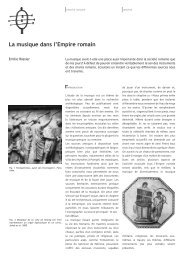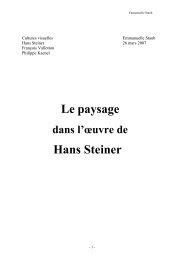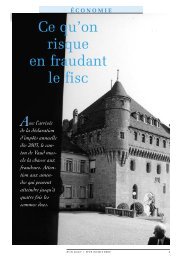conference programme book - European Survey Research ...
conference programme book - European Survey Research ...
conference programme book - European Survey Research ...
You also want an ePaper? Increase the reach of your titles
YUMPU automatically turns print PDFs into web optimized ePapers that Google loves.
128 THURSDAY 21 JULYLatent variable models of cross-naonal survey data oen fit beer in some countries and worse in others,suggesng that the interpretaon of the measurement model is more substanvely plausible in some thanin others. We use marginal residual fit stascs to invesgate whether a 32-country latent class analysis canbe improved by idenfying those groups of countries that are most similar and most different in terms ofinterpretaon, breaking a single joint model for the total sample into a few more sasfactory models for smallergroups of countries. We use it to inform our substanve understanding of public parcipaon in science andtechnology across Europe.3.11.2 Examining <strong>European</strong> atudes towards the governance of biotechnologies: Who trusts whom?N. Allum 3 , P. Stoneman 1 , G. Revuelta 4 , P. Rudolf 21 University of Southampton, United Kingdom; 2 London School of Economics and Polical Science, United Kingdom;3 University of Essex, United Kingdom; 4 Universitat Pompeu Fabra, SpainIt is a well-established finding that cizens who approve of new or controversial technologies tend to trustthose seen as responsible for their development. This trust-approval nexus encompasses sciensts and theirinstuons, governments, regulators and the industries involved in bringing products to the market. In thispaper we examine the social-structural factors and value-orientaons that predispose <strong>European</strong>s to trust ordistrust these actors with respect to two controversial technologies – animal cloning and synthec biology.The former is relavely familiar to many people in 2010 but the laer has barely registered with any but themost informed strata of the <strong>European</strong> public. We capitalise on this contrast to examine the variables that act toproduce default posions of trust and distrust amongst <strong>European</strong>s for unfamiliar and familiar technologies...3.11.3 Worry about Crime among <strong>European</strong> Cizens: A Latent Class Analysis of Cross-Naonal DataJ. Jackson 1 , J. Kuha 11 London School of Economics, United KingdomFear of crime troubles cizens and policy-makers across the industrialised and industrialising world, yet comparaveanalyses are surprisingly rare. Drawing upon data from the <strong>European</strong> Social <strong>Survey</strong>, we assess thedimensionality of four categorical variables that together address the incidence and impact of worry aboutcrime. A model-assisted method based on latent class modelling produces a categorical scale with six levelsthat is comparable across countries. We esmate naonal levels of worry about crime in 23 <strong>European</strong> countriesand we compare the findings with those produced by the standard single indicator (percepons of thesafety of streets aer dark). We finish with a call for comparave work on fear of crime that goes beyonddescripon to address the complex psychological (micro) and sociological (macro) mechanisms underpinningthis far-reaching social and polical phenomenon...3.12 Effects of Interviewers in Sample <strong>Survey</strong>s IITo be held on July 21, 2011 from: 09:00 to 10:30, in room 319.Coordinated by:• Gabriele Durrant - University of Southampton, United Kingdom• Ian Brunton-Smith - University of Surrey, United Kingdom3.12.1 Interviewer Effects on Wave Nonresponse in Longitudinal <strong>Survey</strong>sG. Durrant 1 , R. Vassallo 1 , P. Smith 11 University of Southampton, United KingdomIt is widely recognized that interviewers play an important role in achieving contact and cooperaon from samplemembers in face-to-face surveys. So far, however, much research on interviewer effects on nonresponsehas been carried out for cross-seconal surveys. For longitudinal surveys, although some processes may be



